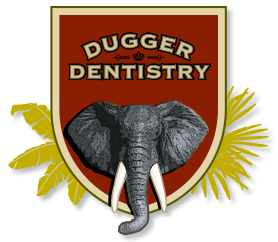The Dangers of Gum Recession

At Dugger Dentistry, our team remains committed to providing our patients with the outstanding dental care they need to enjoy a lifetime of healthy teeth and gums. For patients who want to continue smiling with confidence, avoiding gum disease is vital.
A chronic infection of the soft tissues in the mouth, gum disease causes our gums to become swollen, inflamed, and to bleed easily, especially after brushing and flossing. When left untreated, gum disease can directly lead to a far more serious problem – gum recession.
Gum recession causes gum tissue to move away from the base of our teeth, exposing more of the tooth and the delicate roots the lie beneath. When gum recession develops, pockets, or gaps, begin to form between the gum line and our teeth. This gaps make it easy for harmful oral bacteria to buildup and attach to the delicate roots that are now exposed. If left untreated, the supporting bone structures and tissues that hold our teeth into position may become permanently damaged, leading to tooth loss.
Despite the dangers caused by this condition, gum recession actually ranks as a fairly common dental problem. Because the condition occurs rather gradually, most patients don’t even know they have a problem until told by Dr. Dugger. Tooth sensitivity is usually the first sign of gum recession. You may also notice that your teeth look longer than normal as well. In most cases, you can feel a notch or gap along the gum line.
Due to the threat of permanent tooth loss, gum recession is not a condition any of Dr. Dugger’s patients should ignore. If you think your gums may have started to recede, you need to make an appointment to visit our team at Dugger Dentistry. Once diagnosed, Dr. Dugger can offer a variety of treatment options for restoring your gums back to health.
The Causes of Gum Recession?
Gum recession has a number of causes that include:
Gum disease. A bacterial infection, gum disease destroys the bone structure and soft tissue that holds our teeth into position. Gum disease ranks as the primary cause of gum recession.
Genetics. Some people, despite practicing outstanding oral hygiene, are simply more prone to developing gum disease than others. In fact, one recent study found that up to 30 percent of the world’s population may be predisposed to gum disease, regardless of how well they tend to their teeth.
Overbrushing. While brushing daily is an important part of any oral hygiene routine, it is possible to overdo it. If you brush your teeth with too much force or the wrong way, it can cause tooth enamel to wear down and your gums to recede.
Lack of dental care. Failure to regularly brush, floss, or receive dental care allows plaque to buildup on the surface of your teeth and along the gum line. When left alone, plaque transforms into tartar, a yellowish substance that discolors our teeth and inflames gum tissue. Tartar buildup can directly lead to gum recession.
Hormonal changes. As hormones fluctuate throughout a woman’s life – such as during puberty and pregnancy – gum tissue can become more sensitive and vulnerable to recession.
How is Gum Recession Treated?
Dr. Dugger may be able to treat mild gum recession with a deep cleaning of the affected area. During a deep cleaning – also called root scaling and planning – tartar and plaque buildup is removed from the surface of a tooth’s roots and below the gum line. The exposed root is then smoothed out to make it more difficult for bacteria to attach itself in the future.
In cases where gum recession cannot be treated with scaling and root planning due to excessive bone loss and deep pockets, gum surgery may be required to repair the damage and restore a patient’s gums back to health.
At Dugger Dentistry, We Can Help
If you notice any of the signs of gum recession listed above, or if your smile has started to lose a little of its luster, our team at Dugger Dentistry is here to help. Contact us today to schedule your next dental exam and cleaning with Dr. Dugger and start down the road to enjoy the healthier, better looking smile you deserve.
